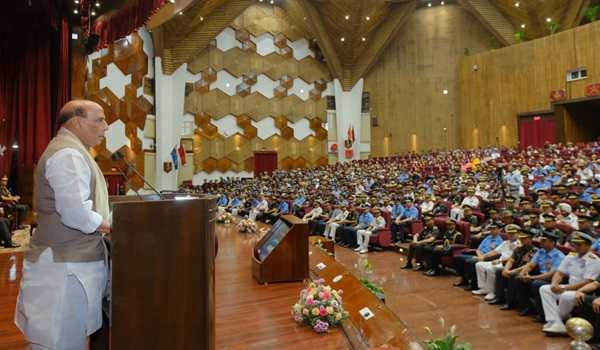Chennai, Apr 10 (UNI) Averring that the threat of proxy war and terrorism emanating
from the epicenter of terrorism in neighborhood compounds India’s diverse range of
security challenges amid persistent threats along Northern and western borders,
Defence Minister Rajnath Singh on Thursday said technology is driving geopolitics
and national security like never before.
Delivering the Convocation address at the Defence Services Staff College at Wellington
in the hilly Nilgiris district of Tamil Nadu, he said Artificial Intelligence and the emerging
basket of technologies – robotics, military autonomy, dronery, quantum, block chain, space,
cyber, electronics, additive manufacturing and the like, are revolutionizing deterrence and
war fighting in critical ways.
“Warfare is moving rapidly, beyond the traditional domains of land, sea, and air, to space,
cyber, the undersea and newer domains of creative endeavor”, he said.
Noting that Dronery for instance, has emerged in Ukraine-Russia conflict, virtually as a new
arm, if not a transformative science, the Defence Minister said the majority of losses of
soldiers and equipment have been attributed neither to traditional artillery nor to armour,
but to drones.
Space capacities in the Low Earth Orbit, similarly, are transforming military intelligence,
persistent surveillance, positioning, targeting and communications – thus taking combat
to a new high, he pointed out.
Observing that the power of technological innovation in combat theatres is breathtaking,
Mr Rajnath said the ongoing conflicts and contemporary trends highlight the fact that the
traditional notions of warfare are being rewritten.
Emerging technologies are impacting the character of war with unmanned systems and
advent of AI forecasting, an era of Autonomous Warfare, he added.
“Warfare today has gone beyond the traditional battlefields of land, sea, and air”, he said.
Stressing the fact that the Armed forces should increasingly need to operate jointly in a
multi-domain environment where cyber, space, and information warfare will be as potent
as conventional operations, Mr Rajnath said “we are in the age of Grey Zone and Hybrid
warfare where Cyber-attacks, disinformation campaigns, and economic warfare have
become tools that can prosecute and achieve politico-military aims without a single shot
being fired.”
India, and for that matter the world, faces a diverse range of security challenges. “In our
case, we face persistent threats along our Northern and western borders. This is further
compounded by the threat of proxy war and terrorism emanating from the epicenter of
terrorism in our neighborhood”, he added.
The on going conflict in West Asia and the geo-political tensions in the Indo Pacific to
our East have their impact on our overall security calculus. In addition, capability to
address non-traditional security threats to include natural disasters and climate change
effects are increasingly becoming important, he added.
MORE UNI GV 1830
